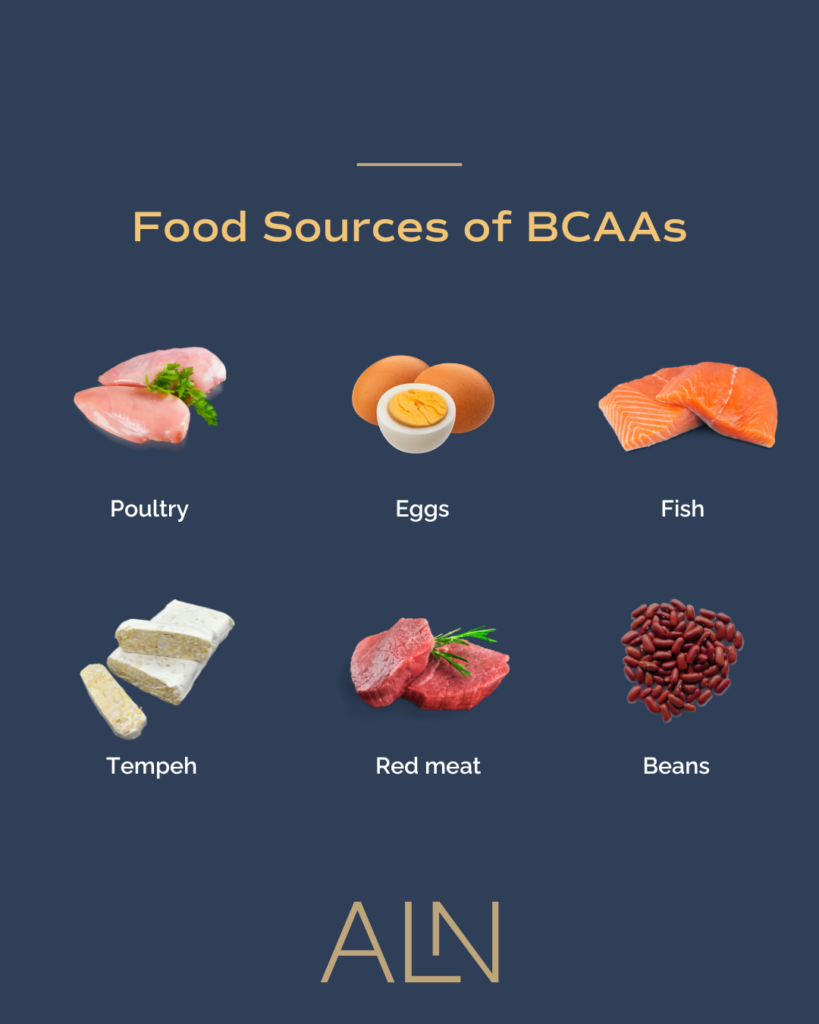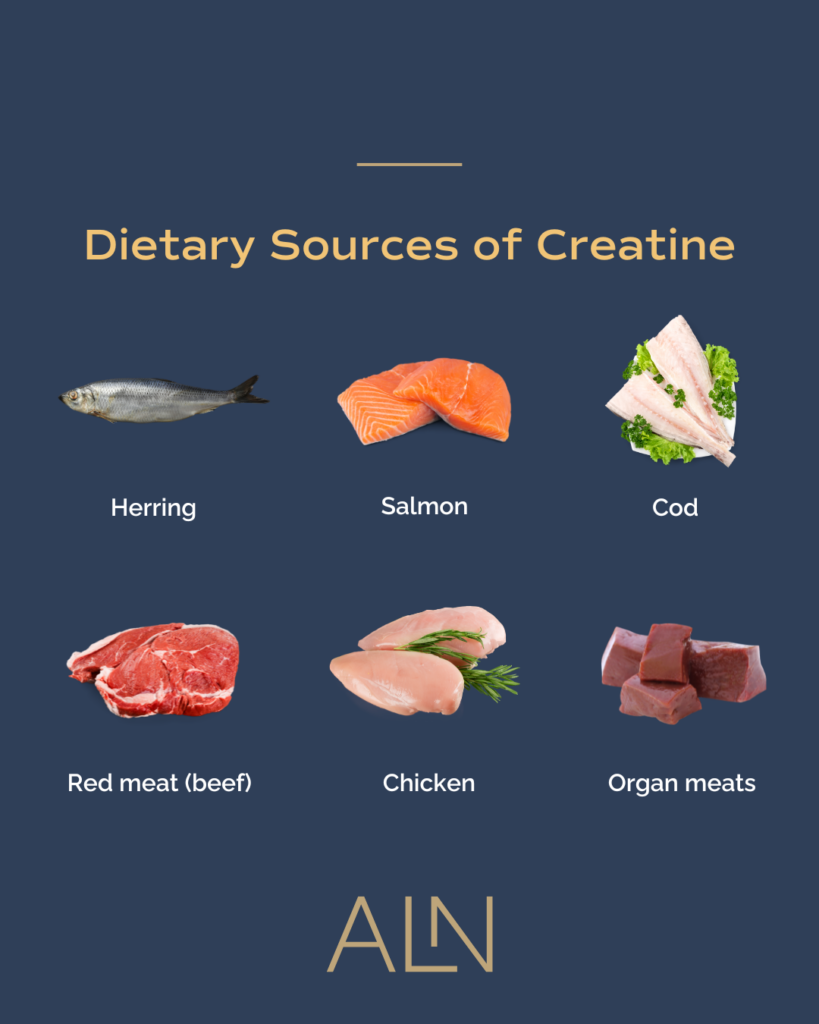Level Up Your Nutrition Game With Our Freebies
Alex
I provide nutrition coaching for endurance athletes to improve performance and body composition through a simple and flexible eating style.
Hi, I'm
ATHLETE EATING GUIDE →
LEARN MORE →
ATHLETE GROCERY SHOPPING GUIDE →
10-DAY PROTEIN-PACKED SAMPLE MEAL PLAN
READY TO FUEL?
incredible value!
The fueling guide bundle serves as your one-stop-shop for strategies to fueling before, during and after your workouts.
Which is better for athletic performance, BCAAs vs creatine? In the realm of performance nutrition, endurance athletes are constantly seeking the holy grail of supplements to boost their stamina, strength, and recovery.
Among the variety of options, two supplements often stand out: Branched-Chain Amino Acids (BCAAs) and creatine. Both BCAAs and creatine are types of amino acids, but between the two, which one is better for athletic performance? And do you really need either of them for success?
In today’s article, we’re unpacking the science behind BCAAs and creatine, shedding light on their roles in optimizing athletic performance. Keep reading to learn more!
What are BCAAs?

BCAAs are three essential amino acids: leucine, isoleucine, and valine, and must be obtained through food sources or nutrition supplementation.
Amino acids are the building blocks of protein. When proteins are digested and broken down, amino acids are the result.
BCAA supplements for runners and triathletes are typically not necessary so long as you are otherwise including protein-rich foods at your meal and snack times. I always recommend a food-first approach before turning to supplements.
Supplements are available in capsule or powder form. Between 4-20g per day is the recommended dosage, though there are no specific recommendations for long-term usage. These supplements typically supply as much leucine as isoleucine or valine, which is a 2:1:1 ratio. This is because leucine may be especially good at stimulating protein synthesis and preventing the breakdown of muscle protein.
The research shows that BCAA capsules or powders are not superior to protein powders and whole protein-rich food sources.
How Can BCAAs Affect Athletic Performance?
BCAAs play a crucial role in muscle protein synthesis, energy production, and can potentially reduce muscle soreness and fatigue after exercise. Athletes often consume BCAA supplements to support muscle recovery and improve exercise performance.
Endurance athletes often subject their bodies to prolonged physical stress, leading to muscle damage and fatigue. Research suggests that consuming BCAAs, especially following intense exercise, may help reduce the onset and severity of muscle soreness, commonly referred to as delayed onset muscle soreness (DOMS). This potential reduction in soreness can assist athletes and fitness enthusiasts in maintaining consistent training schedules, improving exercise recovery, and enhancing overall workout performance.
Though preliminary, some research has shown no effect of supplementing with BCAAs before and during longer duration efforts, such as within a 100km running race. There are no measured differences in performance outcomes or skeletal muscle damage.
BCAAs have also been well-researched in:
- Helping delay fatigue
- Supporting faster recovery
- Reducing muscle soreness post-exercise
- Offsetting muscle tissue losses

What is Creatine and How Does It Work?

Creatine is a type of amino acid and is located mostly in your body’s skeletal muscles (95%), as well as in your brain.
Creatine has been a popular supplement among weight lifters and athletes since the 1990s. It is one of the most well-researched supplements (with over 300 research studies currently), which definitely contributes to its popularity. When surveying male Division 1 athletes in 1999, over 48% claimed to be supplementing with creatine!
How does creatine supplement work? When you take a creatine supplement, creatine production starts in your kidneys with two amino acids: glycine and arginine. The product then moves to your liver, where it interacts with the amino acid methionine to form creatine.
Next, this circulating creatine is brought to your skeletal muscles by small transporters in the cell membrane. The rate at which your body absorbs creatine is determined by your exercise, as well as a variety of other factors.
Overall, it is thought that creatine supplementation increases your stores of phosphocreatine, helping you to produce more energy (in the form of adenosine triphosphate or ATP). Subsequently, your body feels less muscle fatigue and an increase in short-term muscle performance.
Different forms of exercise, such as high-intensity resistance training, rely on your phosphocreatine pathways for energy (ATP). This is why creatine sparked interest in bodybuilders, weight lifters, and other strength-based athletes.
How Can Creatine Affect Athletic Performance?
Now that you have a bit more baseline knowledge about creatine, you are probably wondering, is creatine for runners an effective performance supplement?
There is a ton of research on creatine improving muscle growth and benefiting anaerobic exercises. Anaerobic exercise involves short bursts of energy, compared to aerobic exercise that uses continuous involvement of oxygen, such as endurance sports.
But, there is currently little research that proves that creatine supplementation is beneficial for improving endurance. Studies that have looked into creatine for endurance sports found that endurance performance was not influenced.
Bottom line, using creatine during your in-season training as a runner probably isn’t necessary.
BENEFITS DURING OFF-SEASON TRAINING
It is important to note that creatine could be beneficial for endurance athletes during the off-season, especially if you are looking to put on lean muscle. If you are performing strength training routines with the goal of muscle growth, creatine supplementation could be a valued tool in your toolbox.

BCAAs vs Creatine, What’s the Difference?

The key difference between creatine and BCAAs lies in how they work and the benefits they provide. Both creatine and BCAAs are forms of amino acids with different roles inside your body.
Remember, BCAAs are amino acids leucine, isoleucine, and valine, while creatine is mainly arginine, glycine, and methionine.
Creatine plays a crucial role in providing energy during short bursts of high-intensity exercise, making it particularly beneficial for activities like sprinting or weightlifting.
On the other hand, BCAAs are primarily known for their role in muscle protein synthesis and reducing muscle breakdown during prolonged exercise, making them particularly valuable for athletes who engage in long-duration activities such as distance running or cycling.
While both supplements can offer athletic benefits, it’s important to know the distinction between them.
Which is Better: BCAAs or Creatine?
Between BCAAs and creatine, there is no “better” option. Neither creatine nor BCAAs are necessary supplements to be successful as an athlete.
We have plenty of athletes in our nutrition coaching program who don’t take either creatine or BCAAs and are still crushing their training sessions.
Save your money! Focusing on the basics and ensuring you’re eating enough quality protein is the best way to support your muscles for performance and recovery. You are better off purchasing a quality protein powder that contains all of the essential amino acids (including arginine, glycine, and methionine which form creatine) needed to support lean muscle recovery and repair. A typical whey isolate protein powder will include these amino acids, and you’ll be good to go!
However, we will note that between BCAAs vs creatine supplements, creatine is more researched for it’s benefits on increasing muscle mass. If you do decide to experiment with it, my best advice is to wait until the off-season and keep in mind the timing considerations.
BCAAs or Creatine: The Takeaway
There is no single performance-enhancing supplement that will give you an overwhelming competitive edge versus focusing on your overall nutrition intake to do so. Remember: food first, always!
However, it is up to you as an athlete to make an informed decision about whether BCAAs vs creatine supplements are right for you.
Looking to create an eating style that fits into your active, busy life? My Fueling That Fits Course is perfect for you! In less than six weeks, you will build and design a flexible eating blueprint that showcases how to fuel your athlete body. Without interfering with your busy lifestyle! Make sure to check out the course today.
If you are needing more detailed nutritional guidance, our 1:1 premium nutrition coaching has openings available. Click here to apply today! There is no better time to invest in your health.
Alex
I provide nutrition coaching for endurance athletes to improve performance and body composition through a simple and flexible eating style.
Hi, I'm
LEARN MORE →
take the quiz!
Let's discover your Endurance Nutrition IQ
How well do you know your fueling? Answer these questions and let's see where your endurance nutrition knowledge is at!
Take the quiz
level up your nutrition game with these freebies
free downloadS
Protein-Packed 10-Day Sample Meal Plan
Athlete Eating Guide
Athlete Grocery Shopping Guide
1
2
3
Inspiration to fit 120 grams of protein into your day
Planning what goes on your plate
Putting the right foods in your grocery cart
